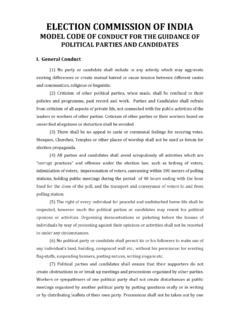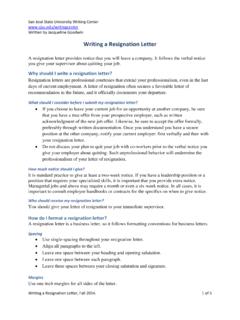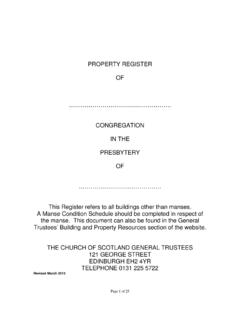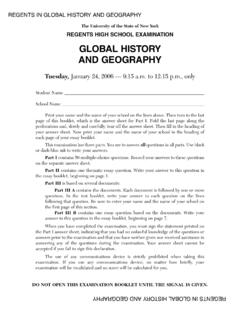Transcription of UNITED CONGREGATIONAL CHURCH OF …
1 Accepted by 35th Assembly August 2009 Page 1 UNITED CONGREGATIONAL CHURCH OF southern africa constitution Accepted by 35th Assembly 25th August 2009 Accepted by 35th Assembly August 2009 Page 2 UNITED CONGREGATIONAL CHURCH OF southern africa constitution PREAMBLE Scripture declares and faith accepts that from the beginning God=s purpose was to gather all people in joyful, loving and permanent communion with Himself and with one another. The CHURCH is the community of those who believe in the one God as Father, Son and Holy Spirit; who thus accept Jesus Christ as Lord and Saviour: and so, by the power of the Holy Spirit, seek to live to the glory of God the Father. They covenant with God and one another to walk together in all His ways and ordinances according to all He has made known to them. The corporate life and fellowship of the CHURCH are experienced most immediately in the local CHURCH , gathered in response to the Word of God to worship, serve and witness to Him.
2 The corporate life and fellowship of the CHURCH are experienced more widely in the denomination. God=s purpose will not, however, be fulfilled until all barriers are broken down, and all the people of God accept one another without reservation as brothers and sisters redeemed through faith in Christ and incorporated into the one family of God. With this understanding of the nature and purpose of the CHURCH , the UNITED CONGREGATIONAL CHURCH of southern africa gives thanks to God for the grace and truth imparted to our forebears, which are our inheritance today. With the same understanding it claims unity with all who, through the centuries and throughout the world today, likewise have sought and still seek to fulfil their common calling by glorifying and serving God, Father, Son and Holy Spirit. The UNITED CONGREGATIONAL CHURCH of southern africa therefore takes its stand alongside the other branches of the Christian CHURCH in acknowledging Jesus Christ as Lord of all and as the Head of the CHURCH , which is His body.
3 With them it exists to worship God, to work to His glory, to witness to His grace, and constantly to be reformed according to His Word. In obedience to its understanding of Christ=s will, it participates in the ecumenical movement and shares in the task of world evangelism and social transformation. It calls all people, society and states to repent and to accept and obey Jesus Christ as Lord and Liberator, in joyful anticipation of the coming fullness of God=s kingdom. 1. NAME The name of the CHURCH is ATHE UNITED CONGREGATIONAL CHURCH OF southern This CHURCH is a union of the churches of the CONGREGATIONAL Union, CHURCH Aid and Missionary Society of South africa , the London Missionary Society of southern africa and the Bantu CONGREGATIONAL CHURCH of the American Board (which later has also been known as the CONGREGATIONAL CHURCH in africa , the Bantu CONGREGATIONAL CHURCH of the American Board of Trustees, the Bantu CONGREGATIONAL CHURCH of southern africa , CONGREGATIONAL Churches of the American Board, African CONGREGATIONAL CHURCH and the American Zulu Mission), the South African Association of the Disciples of Christ (which includes the UNITED Christian Missionary Society in South africa , the South African Association of the Disciples of Christ and the African Christian Churches).
4 2. STRUCTURE, ORGANISATION AND LEGAL STATUS Accepted by 35th Assembly August 2009 Page 3 The UNITED CONGREGATIONAL CHURCH of southern africa (hereinafter called Athe CHURCH @) is composed of local churches, Regional Councils, Synods and an Assembly. The local churches together with the Regional Councils and Synods to which they are assigned, are named in a schedule, which is published in the Directory of the CHURCH . The legal status of the CHURCH is that of a corporate body having perpetual succession and power to own and hold property (immovable, movable and incorporeal) in its own name and independently of its members as well as power to sue and be sued in its own name. The CHURCH as a corporate body possesses all such powers as are requisite for the carrying out of its purposes and functions. 3. THE LOCAL CHURCH A local CHURCH is recognised by the Assembly as a fellowship of members of the CHURCH gathered in a particular locality for worship, witness and service.
5 A local CHURCH may consist of one or more congregations. The measure of autonomy enjoyed by the local CHURCH at the time of the Union, including the freedom to retain any name it has had previously and the right of call, where exercised, continues to be recognised, due regard being had to the interests of other churches. Local churches are formed at the request of existing local churches, on the recommendation of the appropriate Regional Council, or by a Regional Council, in terms of any one or any combination of the following: Division of the existing local CHURCH ; The establishment and constitution of new congregations and local churches; The amalgamation of existing local churches or portions of local churches; The establishment of a UNITED congregation in terms of the Memorandum of Association (Presbyterian/ CONGREGATIONAL ) or in terms of an approved CUC procedure; The inclusion in our existing CHURCH or its recognition as a new local CHURCH any congregation received from another denomination into the CHURCH by the Assembly.
6 In all cases the local CHURCH concerned consults with the Regional Council in whose bounds it falls. Local churches are deemed constituted only when they have been recognised by the Assembly in terms of above. The local CHURCH is constituted in terms of its own constitution , which complies with the Model constitution for Local Churches as the Assembly approves and amends from time to time. Among the powers and duties of the local CHURCH are the following: To hold regular services of worship; to preach the word of God and to celebrate the sacraments of Baptism and the Lord=s Supper; to assume responsibility for the pastoral care of its members and adherents and to witness to Christ within the local community. To elect deacons, elders and other officers. To admit and dismiss CHURCH members in terms of Chapter 3 of the Model constitution for Local Churches as approved by the Assembly.
7 To seek and foster Christian leaders, including candidates for the Ministry, and to recommend them for training to its Regional Council. To participate in the mission of the CHURCH Universal, locally in consultation with its Regional Council and other Christian Churches. Accepted by 35th Assembly August 2009 Page 4 To provide for the training of its people in the Christian way of life. To raise and expend funds; to be responsible for the support of those serving it as ministers; and to share in the work of the whole CHURCH by the payment of assessments as determined from time to time by the Assembly. To be responsible for all that concerns the internal administration of the local CHURCH . To acquire, hold, mortgage, and dispose of property in terms of its own constitution . To appoint representatives to the Regional Council within whose bounds it falls.
8 To submit to its Regional Council matters of concern. To receive audited financial statements in terms of chapter and in the Model Constitutions for Local Churches. 4. THE REGIONAL COUNCIL The CHURCH is divided into Regions whose bounds and designation are determined by the Assembly. The local churches of which each Region is constituted are listed and published in the official Directory of the CHURCH . Legal Status The Regional Council in its organisational aspect and form is a corporate body having perpetual succession and power to own and hold property (immovable, movable and incorporeal) in its own name as well as the power to sue and be sued in its own name. The members of the court of the Regional Council constitute the membership of the Regional Council as a corporate body. The Regional Council functions within the framework of this constitution as a self-governing body.
9 Membership The Regional Council (hereinafter referred to as Athe Council@) consists of: Representative Members elected by local churches within its bounds on a basis as determined from time to time by the Regional Council. Personal Members: accredited ministers and other full-time CHURCH workers as the Council may from time to time determine. Officers of the Council. Committee Convenors. Co-opted members as determined by the Council. Officers Officers are elected for a two-year term of office at an Annual Meeting of the Region and are eligible for re-election for an additional two-year term. Under special circumstances the Region may make exceptions to this procedure. The Chairperson The Chairperson presides over the Council and Administrative Committee meetings. In consultation with the Chairperson-Elect and the Secretary, the Chairperson makes statements on behalf of the Council.
10 The Chairperson performs such other duties as the Council may from time to time determine. The Chairperson is a member ex-officio of all the Committees of the Council. The most recent Past-Chairperson acts as Chairperson in the absence of the Chairperson at his/her request or in the event that the Chairperson is unable to carry out his/her duties. The Chairperson-Elect The Chairperson-Elect holds office for a period of two years and assumes the office of the Accepted by 35th Assembly August 2009 Page 5 Chairperson when the term of office of the Chairperson expires The Secretary The Secretary is responsible for the general administration of the Council and acts as convenor and secretary for the Council and Administrative Committee Meetings. The Secretary is a member ex-officio of all the Committees of Council. The Treasurer The Treasurer is responsible for the general supervision of the finances of the Council.







